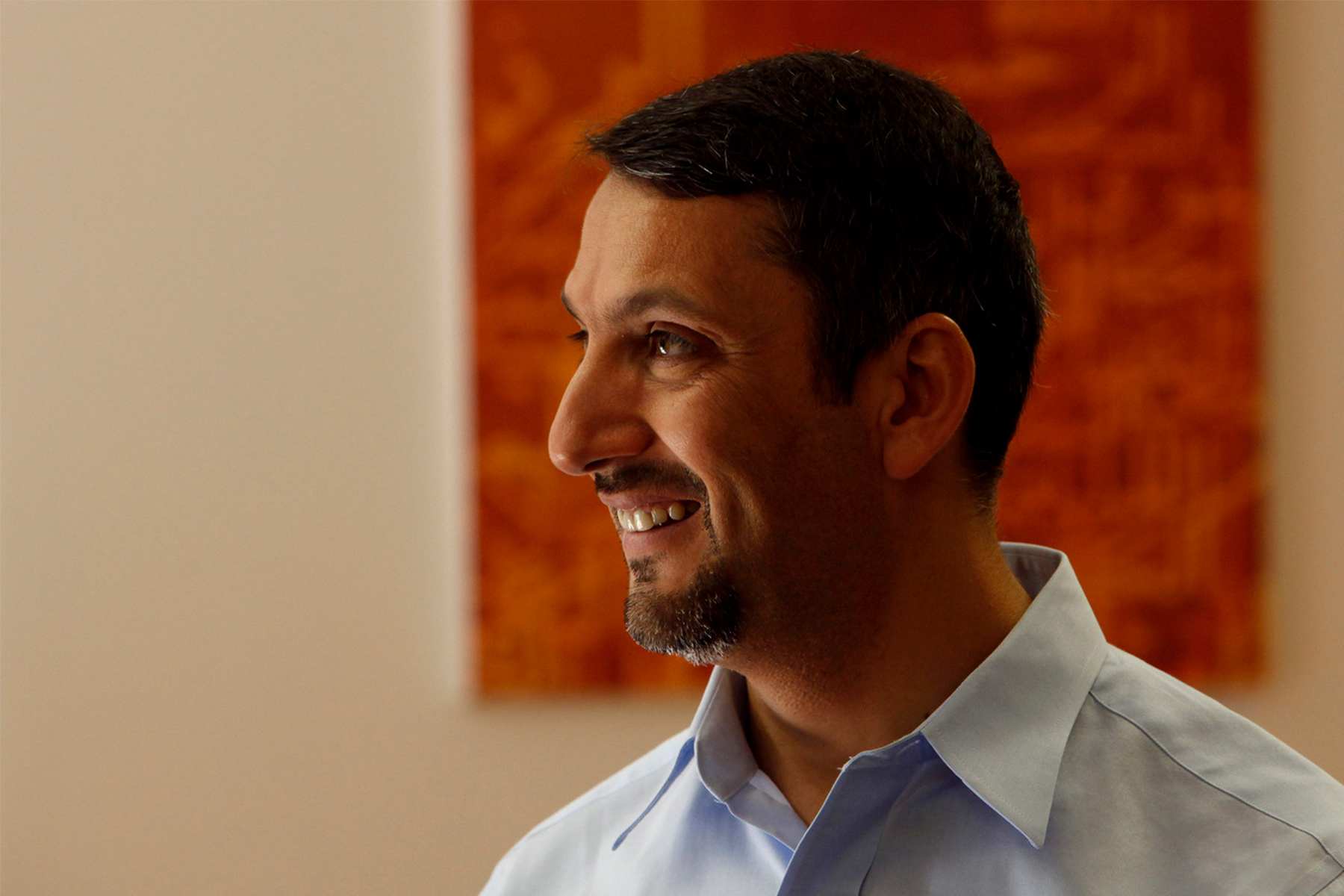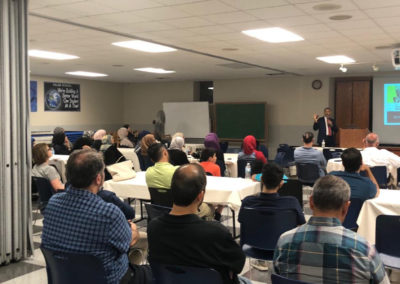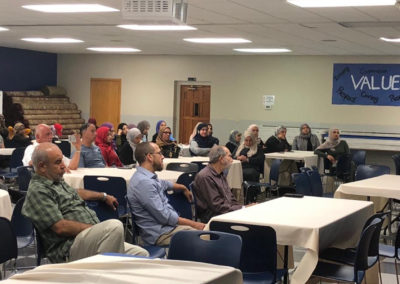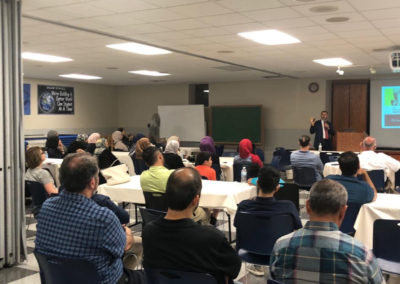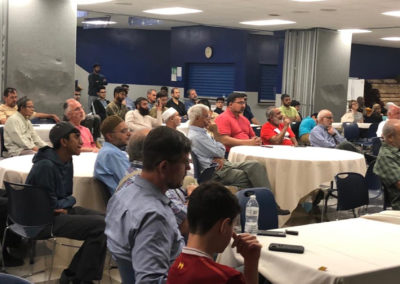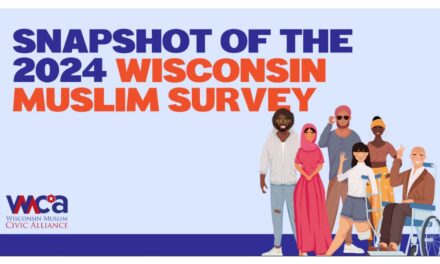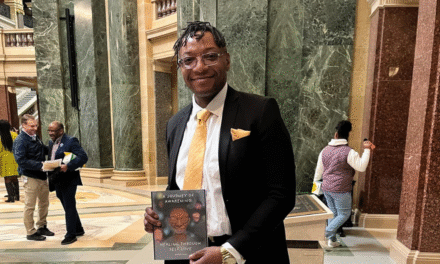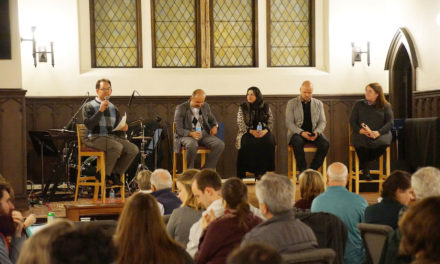Hatem Bazian’s talk at the Islamic Society of Milwaukee last Saturday night was held in a large downstairs room filled with thoughtful Muslims,eager to hear his message about the forces that keep Islamophobia entrenched in contemporary politics around the globe.
In late July, the Muslim Public Affairs Council issued a white paper that described in detail the rise in white supremacist violence and the sometimes tepid enforcement response to it. MPAC’s White Paper presented evidence of international coordination among a diverse group of white supremacist and white nationalist actors. In Milwaukee on Saturday night, Dr. Bazian’s talk completed the picture with evidence that the international coordination begins at the very top.From Donald Trump to wealthy Republican donors who support the war on Palestine, to the Israeli weapons industry and the administration’s backing of autocratic leaders in Europe, South Asia, and the Middle East, “the structural backbone of Islamophobia is organized in the United States,” Bazian said.
Bazian teaches at UC-Berkeley, where he founded the Islamophobia Research and Documentation Project, dedicated to the study of what he calls the “otherizing” of Islam and Muslims.The IRD Project recently issued a report called “Islamophobia in India: Stoking Bigotry,” which Bazian edited. Bazian’s presentation directly connected Narendra Modi’s Hindu-Nationalist agenda in India to Benjamin Netanyahu’s right-wing government in Israel. “Israel is the largest supplier of weapons to India. Modi and Netanyahu are in a closer and closer relationship,” said Bazian.
Modi’s party, the BJP, which controls India’s government, has encouraged violence against Muslims for marrying Hindus(called “Love Jihad”),and“lynching for accusations of being a beefeater,”Bazian said.“At the same time,” said Bazian, “India is the largest exporter of beef in the Muslim world.” In the eyes of the BJP, said Bazian, Indian Muslims are “colonizers, a colonial presence.” But Muslims came to India through trade and inter-marriage, he said, not the war and conquest that precede colonization.
Now the Modi regime seeks to control the formerly autonomous, Muslim-majority region of Kashmir “to make the Hindu nation complete,” Bazian said. In preparation, India has been engaged in building its military into an up-to-date fighting force. “India is one of the top countries in the world in terms of purchases of military equipment,” Bazian said.
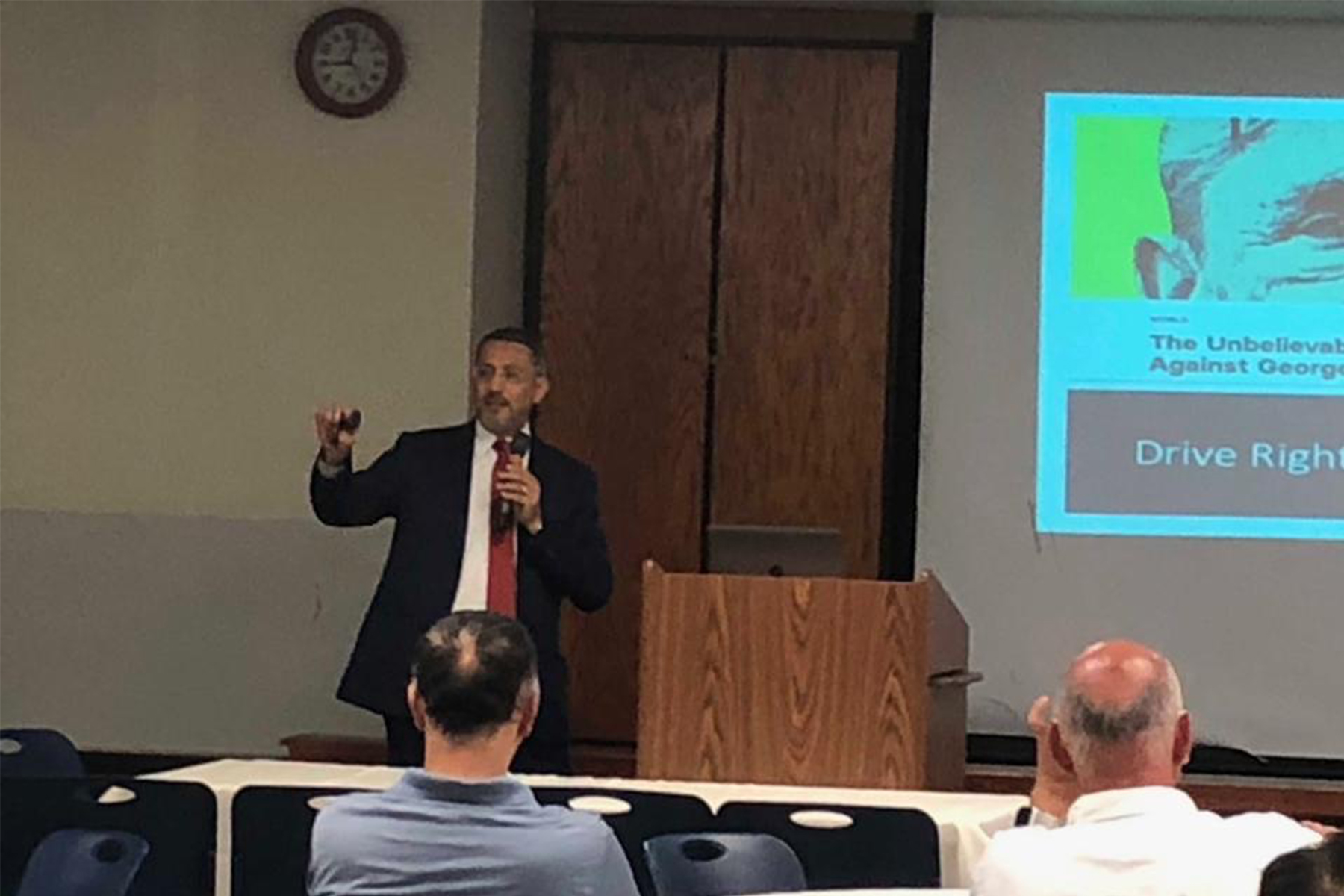
And the primary supplier of the Indian military is Israel, a key player as well in the propaganda war that has resulted in the “intensification of Zionism and right-wing populism in Europe,” Bazian says. Globally, right-wing populist leaders “share resources and replicate strategies and approach.” Trump is echoing right-wing nationalist strategies when he says, for example, that we need to “increase military expenditures in order to make the country great again.”
Essential to the global populist strategy is the need to find scapegoats for its “failed politics,”Bazian said. These scapegoats are usually immigrants or any group perceived as illegitimate for a variety of reasons including race, religion, and ethnic background. These groups then become the focus of xenophobic campaigns that spread terror while revoking citizenship rights. India recently passed a law redefining “who is an Indian?” As a result, scores of Muslims are having their Indian citizenship revoked. In the U.S., many Republican-controlled states practice voter suppression and the federal government has created mass internment camps at the southern border where children are separated from their parents.
Bazian’s presentation emphasized the importance of right-wing media in propelling the global nationalist and Islamophobic agenda. “Right-wing populism is driven by media,” Bazian said. This includes ads on Facebook and Twitter “targeting and otherizing Muslims”; state-controlled newspapers in many parts of the world; and, here in the United States, a private cable network devoted to the right-wing slant on news. By studying the media, “you can draw a connection between Charlottesville and Neo-Nazi parties in Europe,” said Bazian.
One of the writers that Bazian cited as inspiring Islamophobia was author Daniel Pipes, founder of the Middle East Forum, an Islamophobic website under the guise of national security. Pipes rose to prominence after 9/11 and has written that the “increased stature, and affluence, and enfranchisement of American Muslims . . . will present true dangers to American Jews.”According to Bazian, Pipes has even gone so far as to suggest the internment of Muslims as part of the War on Terror.
A network of funding sources exists to support Islamophobic right-wing populism. MJ Rosenberg, writing in The Nation, pointed to the influence of billionaires Sheldon Adelson and Haim Saban, who, he said, “have recently turned up as key players behind the Israeli-American Council.”
From Tea Party “patriots” to Dutch Neo-Nazis, 70 percent of the funding for right-wing populist organizations comes from pro-Israel sources. In a seven-year period, the Islamophobia industry spent $216 million, spreading cash around to groups like Jihad Watch, Campus Watch, the American Defense Initiative, the American Jewish Committee (a pro-Israel lobbying group), and the ADL, Bazian says. Rosenberg suggests that Adelson and Saban want to become “the Koch brothers of Israel.” Adelson is said to be a key player behind the controversial move of the United States Embassy from Tel Aviv to Jerusalem.
Of course, the ostensible goal of much of this activity is to “stop radical Islamic terrorism.” Israel, besides being the arms supplier for much of the Gulf and South Asia, is also the “sub-contractor for anti-Muslim terrorism training,” given to U.S. Police departments, said Bazian, another aspect of the mainstreaming of the nationalist, Islamophobic agenda, particularly in the U.S.
Bazian points out that books like Steven Emerson’s American Jihad and David Horowitz’s The Professors can be purchased next to candy and gum at the airport. “So that means Islamophobia is mainstream,” Bazian says. But he also pointed out that “silence never changed things. These are not scholarly works. Calling them ‘yellow journalism’ as an insult to journalism.” Bazian urged his audience to speak out, even in so far as “speaking to the manager” of that airport bookstore about the content of the shelves. “Be assertive about it,” he said, of asking that racist material be removed from store shelves.
Following the talk, an audience member asked how to respond to such a well funded industry. “Your strength is your presence,” Bazian replied.
